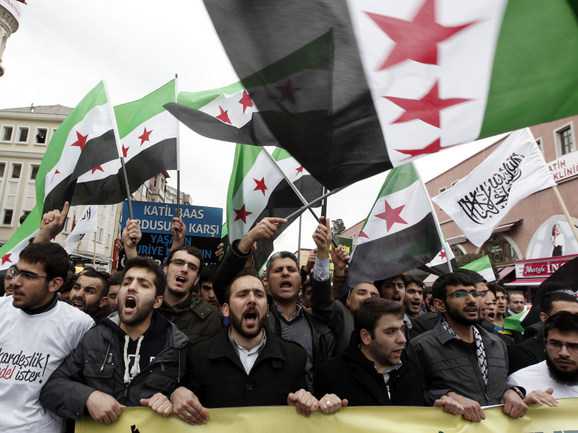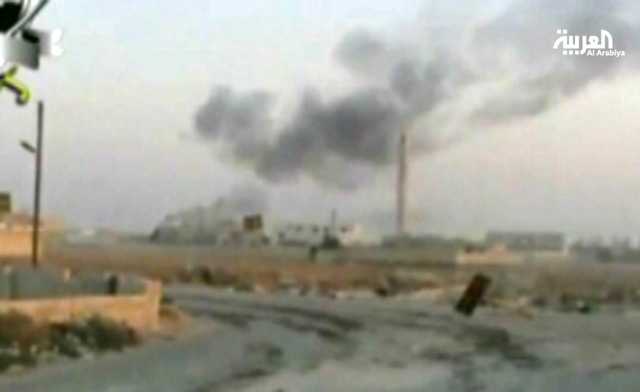Saturday, September 1st, 2012 | Filed under EUROPE,GEOPOLITICS,Islamic law,ISLAMIC TERRORISM,Latest Articles,MIDDLE EAST,NORTH AMERICA,Recent Posts,RELIGIOUS PERSECUTION,Uncategorized,USA | Posted by admin
Why no US sanctions against France, Turkey, Saudi Arabia, Qatar and UK for supporting FSA terrorism?
Murad Makhmudov and Lee Jay Walker
Modern Tokyo Times
The United States after the barbaric attack by mainly Saudi citizens on September 11 stated that they would adopt a policy aimed at crushing terrorism. If so, will France, Turkey, Saudi Arabia, Qatar and the UK face American sanctions for supporting the brutal terrorist policies of the Free Syrian Army (FSA)? This is a fair question because the FSA is behind countless terrorist attacks including killing politicians, targeting journalists, using car bombs to slaughter innocents and other vile deeds.
Individuals may or may not support the government of Syria; however, this isn’t the point. At no time in recent history was a terrorist organization like the FSA supported openly by so many governments. The United States is clearly involved in CIA covert acts against Syria and this is notable in Turkey because of the geopolitical reality. However, despite this the Obama administration is at pains to distance itself from al-Qaeda and other Islamist networks which are also causing carnage in Syria. This doesn’t mean that members in the Obama administration don’t welcome the Islamist angle at the moment but given the sensitivity over September 11, then actions must be based on being cunning and manipulating the media.
VIDEO EVIDENCE AGAINST THE FSA AND ISLAMIST NETWORKS – (WARNING – VERY GRAPHIC)
Saudi Arabia and Qatar are clearly supporting sedition and the knock on effect of this is sectarianism and terrorism. Likewise, the former leader of France and the new leader have openly sided with the FSA against the government of Syria. This is despite the vile acts of the patchwork of terrorists and mercenaries within the FSA. After all, the FSA have killed religious minorities, done car bombs, killed journalists, assassinated political ministers, beheaded individuals, killed Iraqi refugees in Damascus – and a whole array of evil deeds.
The United Kingdom appears to be following the path chosen by the Obama administration. This applies to condemning the Syria government and armed forces while remaining muted when the FSA is blamed for killing people. Also, just like America, it is clear that British covert operatives are utilizing the many links with regional nations. However, political leaders in London and Paris appear to want to intervene militarily on the side of terrorism but both nations want the full support of America before stepping over the direct interventionist line.
Media outlets continue to shame themselves by adopting a constant policy of incitement against Syria. Likewise, Human Rights Watch (HRW) appears to be the “political wing” of the FSA by constantly condemning the Syrian government while remaining muted about the vile deeds of the FSA. Indeed, by mentioning massacres from time to time by the FSA some media outlets and HRW are trying to cover their tracks but clearly media corporations and many human rights organizations are playing their part in inciting hatred.
Tony Cartalucci (Land Destroyer Report) comments that “It was recently pointed out that the Libyan Islamic Fighting Group (LIFG) currently arming, funding, and commanding entire brigades of the so-called “Free Syrian Army” (FSA) is designated an Al Qaeda affiliate by the United Nations pursuant to resolutions 1267 (1999) and 1989 (2011), in addition to being listed by both the US State Department and the UK Home Office (page 5, .pdf) as a foreign terrorist organization and a proscribed terrorist organization respectively.”
“This means that the United States, the UK, NATO, and the Gulf State despots of Saudi Arabia and Qatar are knowingly and willfully funding designated affiliates of Al Qaeda contrary not only to US and British anti-terror legislation, but contrary to UN resolutions as well. Western and Gulf State support of the FSA constitutes state sponsorship of terrorism. Should the UN fail to enforce its own resolutions, while playing host to further sanctions and considerations for military intervention against the Syrian government, it will have entirely resigned its legitimacy and authority as nothing more than a tool of Western corporate-financier interests.”
The above comment raises the already known fact that American ratlines to FSA terrorism is in “a very dark and deep danger zone.” It is difficult to image after September 11 that any American administration would side openly with international terrorism. However, the role of Hillary Clinton, Susan Rice and many others in covering up the crimes of the FSA while bridging international support for this vile terrorist organization, is not only sickening but it raises deeply disturbing issues.
After all, what is the point in offering “American soldiers to Islamists” in Afghanistan and Iraq respectively, if the same evil forces are then supported to topple a secular government in Syria? Are the deaths of thousands of American soldiers so cheap? It should be raising serious questions in America because now the same Islamists who were fighting American troops in Iraq are now being allowed to enter Syria courtesy of the friends of America in Turkey, Saudi Arabia and Qatar.
Clearly the recent terrorist attack which killed many people during a funeral procession means little to political circles in Ankara, Doha, London, Paris, Riyadh and Washington. Therefore, the FSA is showing the world that democratic nations are openly siding with feudal monarchies in Qatar and Saudi Arabia in funding and supporting this brutal terrorist organization. It means that to the above political elites that killing minorities, beheading people who support the Syrian government, hanging individuals, car bombs, destroying Christian areas, inciting massacres against the Alawites, political assassination, killing journalists who support the Syrian government and a whole array of barbaric acts is not only being tolerated but it is being supported.
If the United States is serious about defeating the forces of terrorism then firstly this nation should be putting sanctions on France, the United Kingdom, Turkey, Saudi Arabia and Qatar. After this, then political elites in Washington involved in ratlines should be charged with spreading terrorism in Syria. Of course, this isn’t going to happen and clearly September 11 this year is an event which is going to be politicized by the same forces supporting terrorism, sectarianism and sedition against Syria.
The mainly Christian Karen forces in Myanmar have been fighting for decades against various governments of this nation. However, this organization isn’t supported openly because the “wrong religion” to elites in Riyadh and Washington. Also, they don’t go around beheading people and video-taping their crimes. This rebel movement isn’t brutal enough to be supported despite their cause being based on ethnic and religious persecution.
The madness of the FSA is that political elites in Washington, Paris, London, Ankara, Riyadh and Doha have all sunk to new lows and this says a lot given the past history of these respective nations. Therefore, it is currently open season against secular Syria and the various minorities of this nation whereby a rich civilization faces Talibanization and utter brutality. Media agencies and HRW have all jumped on the bandwagon and now they resemble the “FSA party machinery.” Moscow is disgusted that nations are supporting sectarianism, terrorism and sedition but while their words of rebuke can be heard the same terrorist ratlines keep on increasing.
In a world based on international law and “the genuine fight against terrorism” then America would firstly put its allies in the “political dock” and then enter elites within America in “the same dock.” However, in the world of reality it is clear that the FSA can behead people, hang loyalists, do car bombs, kill government politicians, invade major cities to spread more carnage, attack people at funerals, kill refugees, kill journalist, torture people, cleanse Christians and target anyone deemed to be an enemy. If this is the new world order then God help the next country which will be targeted by evil forces in Washington, London, Paris, Ankara, Doha and Riyadh.






